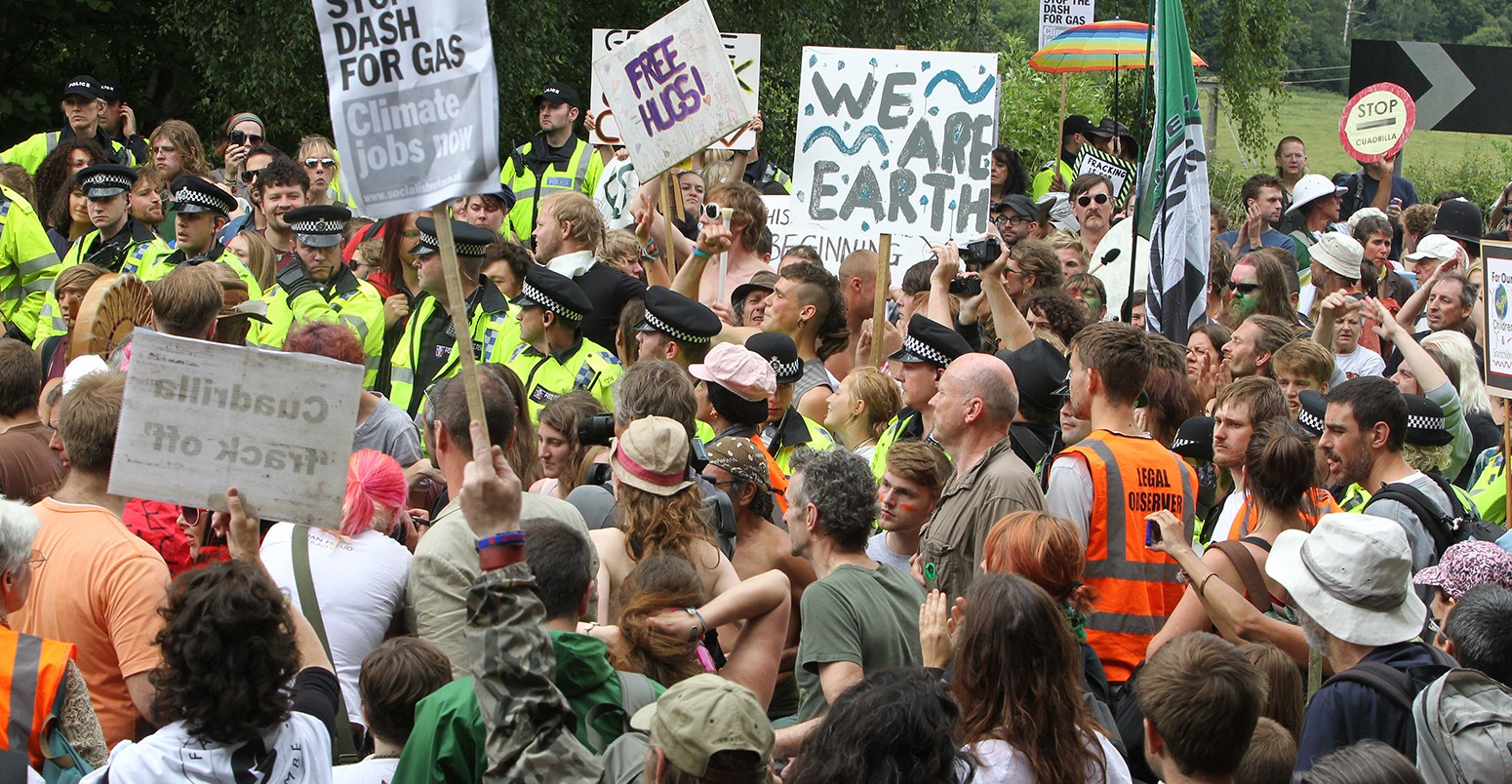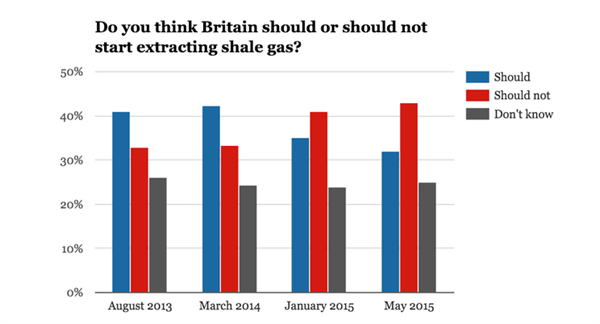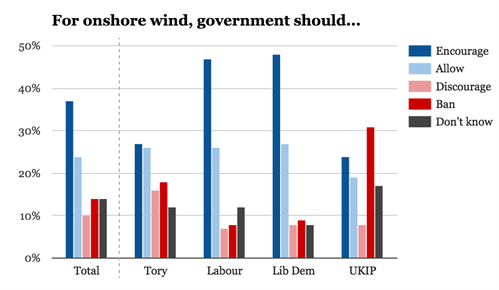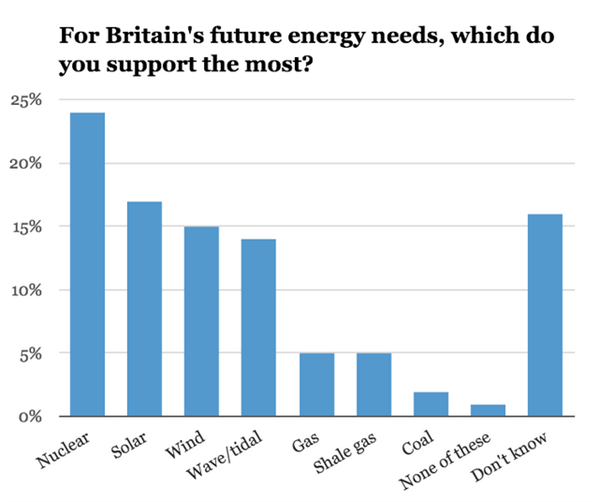
Opposition to fracking increases again, finds Sunday Times poll
Simon Evans
05.18.15Simon Evans
18.05.2015 | 5:00pmThe British public is becoming increasingly opposed to fracking for shale gas, a series of polls for the Sunday Times show. However, as with some previous polling on energy and climate issues commissioned by the paper, it has not reported the findings.
Support for shale gas extraction has fallen to its lowest level since the series began, falling below one third of respondents for the first time. Opposition has reached its highest level.
The latest survey also finds majority support for allowing or encouraging onshore windfarms and a strong majority in favour of the government either maintaining or scaling up its action on climate change.
Carbon Brief has the numbers, which should provide interesting reading for the new Conservative government, given its support for fracking and opposition to subsidised onshore wind.
Rising opposition to shale gas
Polling organisation YouGov conducts regular surveys for the Sunday Times, covering a varying range of topical political and economic issues. However, since 2013 it has asked an identical question on support for exploiting the UK’s shale gas reserves.
This coincided with the point when fracking started to enter the public consciousness in summer 2013 when protesters, including Green MP Caroline Lucas, flocked to a proposed site near Balcombe in West Sussex.
The Sunday Times surveys begin by setting out opposing views on fracking, and then ask:
Carbon Brief has compiled responses to this question from August 2013, March 2014, January 2015 and May 2015. Between 1,500 and 1,900 members of the public were polled on each occasion.
Those in favour of extracting British shale gas (blue bars, below) outnumbered those against (red bars) in the first two polls. This switched at some point between March 2014 and January this year, with opposition hardening since then. In mid-May some 32% of respondents said Britain should start extracting shale gas against 43% that said Britain should not. The share of respondents that said they didn’t know has remained substantial and relatively constant.

Source: YouGov polls carried out in May 2015, January 2015, March 2014 and August 2013 for the Sunday Times.
More men support fracking than women
There is an interesting gender divide on this issue, with men (graph, below left) consistently more in favour of shale gas than women (below right). However, opposition has grown and support weakened among both men and women since 2013.

Source: YouGov polls carried out in May 2015, January 2015, March 2014 and August 2013 for the Sunday Times.
Community payments boost fracking support
In common with developments of any kind, surveys tend to find greater levels of opposition to shale gas if it will be nearby. The latest Sunday Times figures repeat this finding (far left bars, below), with 49% of respondents opposing fracking “in a town or village near to you”.

Source: YouGov poll for the Sunday Times, May 2015.
Communities that host shale gas extraction sites are set to receive payments of hundreds of thousands of pounds. The money will be given to local councils. The latest Sunday Times poll tests whether support for fracking would increase if councils were to receive more money.
The results suggest larger community benefits payments may help win people over, but that the impact is insufficient to turn net opposition to shale gas into net support. Even a promise to pay £10 million leaves support for nearby fracking at 36%, with 40% opposed (far right bars, above).
Carbon Brief examined a range of polls on shale gas from government and other sources earlier this year, finding that fracking divides opinion in the UK like no other energy source. Levels of support depend in part on how pollsters phrase their questions. However, this latest YouGov poll in a consistent series suggests opinion may be turning further against shale gas.
Support for onshore wind
The poll shows continuing public support for onshore wind, with a majority of respondents (61%) in favour of the government either actively encouraging or allowing new windfarms to be built (blue bars, below). A quarter would like the government to discourage or ban onshore wind (red and pink bars).
Opposition to onshore windfarms was higher among respondents that said they had voted Conservative or UKIP, but was still outweighed by support.

Source: YouGov poll for the Sunday Times, May 2015.
Polling conducted for the Sunday Times, but not reported by the paper, has found strong support for onshore wind before. Some 56% of respondents to a 2011 survey wanted to see more investment in onshore wind.
Support for low-carbon energy over fossil fuels
A new question added to the latest YouGov tracker asks respondents to think about Britain’s future energy generation needs. It asks them to rate the energy source they support the most.
The results show low-carbon energy sources rated far ahead of fossil fuels (chart, below). A majority chose nuclear (24%) or renewables (46%), with very minimal support for gas (10%) or coal (2%).

Source: YouGov poll for the Sunday Times, May 2015.
Support for stronger government action on climate
The YouGov poll also finds a large majority in favour of maintaining or increasing government action on climate change. Some 50% said the government was not doing enough and 21% said it had the balance about right (far left bars, below). Only 13% said the government was doing too much.

Source: YouGov poll for the Sunday Times, May 2015.
The results come despite what appears to be a leading question, asking first if the government is doing too much on climate change.
There is strong support for maintaining or increasing government climate action from across the political spectrum, the polling suggests. These supporters outweighed those saying the government was doing too much on climate change, even among those that said they’d voted UKIP at the recent election.
Support for scaling back climate efforts appears extremely thin, apparently vindicating David Cameron’s pledge to push ahead with domestic and international climate action in the face of consistent opposition from large parts of the national press.
Main image: Anti-fracking protest, Balcombe, UK.
Update 19/5 - We corrected the article. Balcombe is in West Sussex, not East Sussex.

